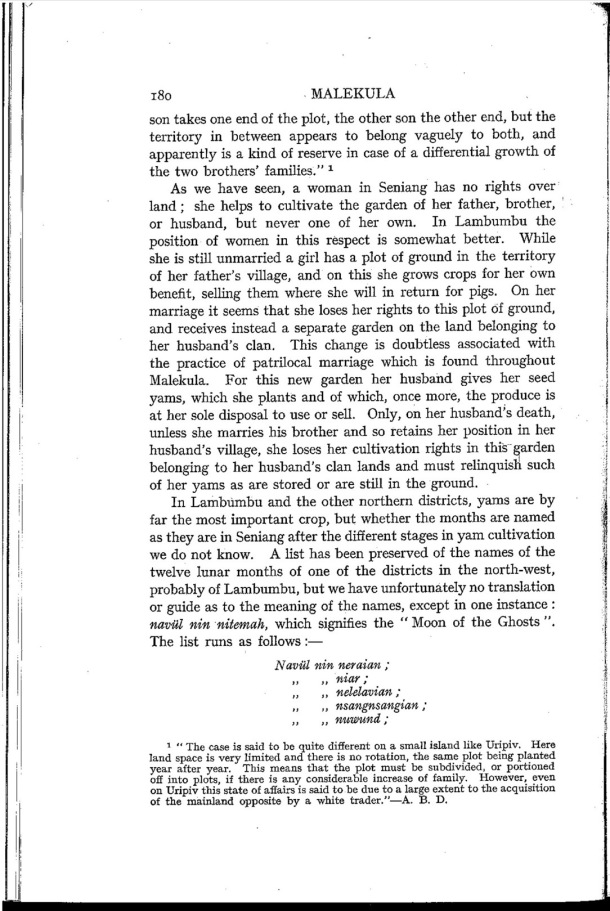|
|  [Note: this transcription was produced by an automatic OCR engine]
I80 - MALEKULA
son takes one end of the plot, the other son the other end, but the
territory in between appears to belong vaguely to both, and
apparently is a kind of reserve in case of a differential growth of
the two brothers’ families.â€ù 1
As we have seen, a woman in Seniang has no rights over
land; she helps to cultivate the garden of her father, brother,
or husband, but never one of her own. In Lambumbu the
position of women in this respect is somewhat better. While
she is still unmarried a girl has a plot of ground in the territory
of her father’s village, and on this she grows crops for her own
beneï¬Åt, selling them where she will in return for pigs. On her
marriage it seems that she loses her rights to this plot of ground,
and receives instead a separate garden on the land belonging to
her husband's clan. This change is doubtless associated with
the practice of patrilocal marriage which is found throughout
Malekula. For this new garden her husband gives her seed
yams, which she plants and of which, once more, the produce is
at her sole disposal to use or sell. Only, on her husbandis death,
unless she marries his brother and so retains her position in her
husband's village, she loses her cultivation rights in thisgarden
belonging to her husband's clan lands and must relinquish such
of her yams as are stored or are still in the ground.
In Lambumbu and the other northern districts, yams are by
far the most important crop, but whether the months are named
as they are in Seniang after the different stages in yam cultivation
we do not know. A list has been preserved of the names of the
twelve lunar months of one of the districts in the north-west,
probably of Lambumbu, but we have unfortunately no translation
or guide as to the meaning of the names, except in one instance :
navï¬Ål nin nitemah, which signiï¬Åes the " Moon of the Ghosts
The list runs as follows :—
N avzil nin neraian ;
, , Mill? ,'
, , nelelavian;
, , nsangnsangian ,'
, , n/ww1md;
l " The case is said to be quite diï¬Åerent on a. small island like Uripiv_ Here
land space is very limited and there is no rotation, the same plot being planted
year after year. This means that the plot must be subdivided, or portioned
off into plots, if there is any considerable increase of family. However, even
on Uripiv this state of affairs is said to be due to a large extent to the acquisition
of the mainland opposite by 8. white trader."—A. B. D4
1
W
1
1
%
|